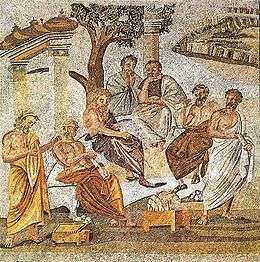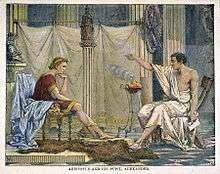Scholarch



A scholarch (Ancient Greek: σχολάρχης, scholarchēs) was the head of a school in ancient Greece. The term is especially remembered for its use to mean the heads of schools of philosophy, such as the Platonic Academy in ancient Athens. Its first scholarch was Plato himself, the founder and proprietor. He held the position for forty years, appointing his nephew Speussipus as his successor; later scholarchs were elected by members of the Academy.
The Greek word is a produced compound of scholē (σχολή), "school,"[1] and archē (ἀρχή), "ruler."[2] The Romans did not choose to Latinize the word, perhaps because they had no archons. They used sholasticus instead, "savant,"[3] which always applied to headmasters.
Usage in Latin and English
English does not use either of those two words for the name of the ancient office, but prefers scholiarch, a word that is not generally listed in the dictionary, because considered in error. If it were a produced word; i.e., a meaning compounded from words of known meaning, then it ought to mean "master of the scholia," a specious etymology sometimes put forward. Scholiarch was not known in classical, vulgar, or mediaeval Latin. It does appear in the New Latin of Renaissance monastic schools in Europe with reference to the schoolmaster. The Thesaurus linguae Latinae of 1573 by Robertus Stephanus, a Parisian known to English authors as Robert Stephens, uses it to define scholasticus: vel Scholiarchus recte dicitur, qui in collegiis sacerdotum barbare vocatur, referring to the "colleges of priests."[4] What he meant by barbare is not very clear, but if the reference is to the Jesuit schools (which educated priests) then he appears to have been under the impression that scholiarch was the original office. Stephens was a Protestant convert from Catholicism. As he was a printer, his use of scholiarch perpetuated the word in English scholarship. It is used almost exclusively in the 19th and 20th centuries CE.
Contemporaneously with the innovation of "scholiarch" in the secular literature was a reinstitution of the ancient term in New Latin to describe the headmasters of the cathedral schools. In Christian society of the Middle Ages the cathedrals were responsible for maintaining grammar schools in their vicinity. These institutions were the cultural descendents of the ancient grammar schools that prevailed during the Roman Empire.
This basic educational necessity did not disappear with the advent of Protestantism; to the contrary, in Britain the Cathedrals and their schools were inherited by the Church of England, which continued to try to maintain New Latin as the language of the church. In this system the headmasters were denoted by a variety of Latin terms: the custodes, the magistri scholarum, and the scholarum praefecti. The Renaissance and subsequent neoclassicist periods saw a revival of interest in ancient Greek culture, which resulted in a new overlay of Hellenic terms on the Medieval Latin surviving from the empire, recognizable today as the mixed Greek and Latin words of scientific terminology. In the linguistic environment of the cathedral schools, a new term appears: the scholarchus, the headmaster.
Social status
The social status, duties and legal powers of the headmaster depended on the society in which he conducted his school. In a small school, he might be the only or the chief teacher. In a university-sized school he would be the director of the school, its museum, and its library. Plato as scholiarch owned his school, the land, and the rest of the property. He had to sponsor the resident foreigners, representing them at law. Aristotle at the foundation of the Lyceum was not, as a resident foreigner, allowed to own property in Athens. He rented the buildings and organized the students into an administration. Socrates was a voluntary consultant who conducted discussions at various times and places, some public, others contributed by interested persons.The scholiarchs of Alexandria were royal officers hired by the king.
Some major scholarchs
A list of scholarchs of the four main philosophy schools in Athens during the Hellenistic period, with the approximate dates they headed the schools, is as follows:[5]
| Academy | Lyceum | Stoa | Garden |
|---|---|---|---|
|
388-348 Plato |
335-322 Aristotle |
300-262 Zeno of Citium |
307-271 Epicurus |
Notes
- ↑ Liddell, Henry George; Scott, Robert. "scholē". A Greek-English Lexicon. Perseus Digital Library.
- ↑ Liddell, Henry George; Scott, Robert. "archē". A Greek-English Lexicon. Perseus Digital Library.
- ↑ Lewis, Charles T.; Short, Charles. "scholasticus". A Latin Dictionary. Perseus Digital Library.
- ↑ Estienne, Robert (1573). Thesaurus linguae latinae: seu Promptuarium dictionum et loquendi formularum omnium ad Latini sermonis perfectam notitiam assequendam pertinentium, ex optimis auctoribus concinnatum (in Latin). 4. Lugduni: [s.n.] p. 57.
- ↑ Dorandi, Tiziano (1999). "Chapter 2: Chronology". In Algra, Keimpe; et al. The Cambridge History of Hellenistic Philosophy. Cambridge: Cambridge University Press. p. 53. ISBN 9780521250283.